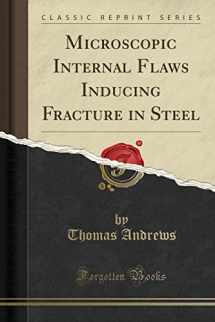
Microscopic Internal Flaws Inducing Fracture in Steel (Classic Reprint)
ISBN-13:
9781330143926
ISBN-10:
1330143922
Author:
Thomas Andrews
Publication date:
2018
Publisher:
Forgotten Books
Format:
Paperback
56 pages
FREE US shipping
Book details
ISBN-13:
9781330143926
ISBN-10:
1330143922
Author:
Thomas Andrews
Publication date:
2018
Publisher:
Forgotten Books
Format:
Paperback
56 pages
Summary
Microscopic Internal Flaws Inducing Fracture in Steel (Classic Reprint) (ISBN-13: 9781330143926 and ISBN-10: 1330143922), written by authors
Thomas Andrews, was published by Forgotten Books in 2018.
With an overall rating of 3.9 stars, it's a notable title among other
books. You can easily purchase or rent Microscopic Internal Flaws Inducing Fracture in Steel (Classic Reprint) (Paperback) from BooksRun,
along with many other new and used
books
and textbooks.
And, if you're looking to sell your copy, our current buyback offer is $0.09.
Description
Excerpt from Microscopic Internal Flaws Inducing Fracture in SteelThe author has for many years past been engaged on researches with the object of ascertaining some of the causes of the deterioration of metals leading to the accidental fracture of railway axles, propeller shafts, and other metallic constructions. He has recently studied the "Effects of Temperature on the Strength of Railway Axles," in an investigation extending over ten years, and has determined, on a large experimental scale, the resistance of metals to sudden concussions at varying temperatures down to zero (0 deg.) Fahr., and indicated the influence of climatic temperature changes on the strength of railway material; the experiments showing that, under certain conditions, temperature is a potent factor in leading to the deterioration of the resisting strength of railway axles and shafts. The author has also completed another investigation on the "Effect of Strain on Railway Axles," in which some other aspects of the deterioration by fatigue in metals have been experimentally examined. If it were possible to produce a perfect metal, theoretically, there should be no deterioration by fatigue; but, alas! this at present seems almost impossible.Imperfections abound without, within,In toughest metals as metallic sin.All, therefore, that the metallurgist and scientific investigator can do is:1. To endeavour to find out the ultimate causes of internal defects in metals.2. To minimise the deleterious influence of these, if possible, in existing structures.About the PublisherForgotten Books publishes hundreds of thousands of rare and classic books. Find more at www.forgottenbooks.comThis book is a reproduction of an important historical work. Forgotten Books uses state-of-the-art technology to digitally reconstruct the work, preserving the original format whilst repairing imperfections present in the aged copy. In rare cases, an imperfection in the original, such as a blemish or missing page, may be replicated in our edition. We do, however, repair the vast majority of imperfections successfully; any imperfections that remain are intentionally left to preserve the state of such historical works.


We would LOVE it if you could help us and other readers by reviewing the book
Book review

Congratulations! We have received your book review.
{user}
{createdAt}
by {truncated_author}


